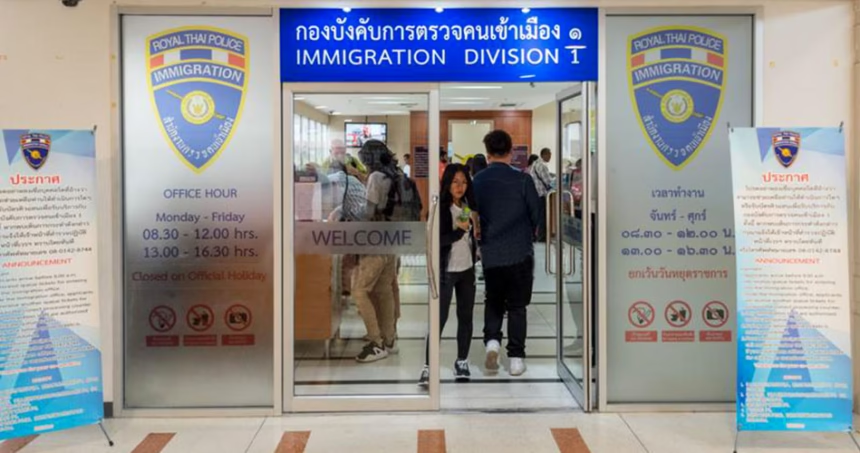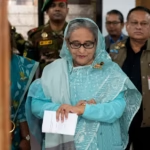CHIANG RAI – As the cool season approaches and the hills of northern Thailand fill with visiting farang (foreigners), a different kind of chill is spreading through immigration queues across the country. Thailand, long proud of its “Land of Smiles” welcome, is rolling out tougher visa extension rules aimed at stopping misuse of its generous visa extension rules.
What started as a post‑pandemic boost to tourism, with longer visa‑free stays and easy border runs, has turned into a serious headache for officials. Reports of illegal work, scam operations, and permanent “tourists” living off back‑to‑back entries have pushed the government to act.
Many of the new measures already apply, and they could reshape how short‑term visitors and long‑term residents experience the Kingdom, from Bangkok’s shining temples to the cafés of Chiang Rai.
Tourism still carries a huge weight in the Thai economy. The sector accounts for more than 20% of GDP, and the country welcomed around 40 million visitors in 2024, helped by the 60‑day visa exemption launched in July that year. With this surge, complaints grew from local communities and officials about visitors stretching, or outright abusing, the rules.
“We have seen too many cases of tourists turning into long‑term residents without contributing in a fair way,” said Pol Lt Gen Phantipha Phutthawong of the Immigration Bureau during a recent briefing. With peak season close, anyone flying through Mae Fah Luang Airport in Chiang Rai or Suvarnabhumi in Bangkok is urged to check their documents carefully, or risk being refused at the border.
The Visa Exemption Crackdown: From Open Arms to Tough Controls
The timing is no accident. Economic pressure and security concerns have combined to push the government towards stricter checks.
Since early 2025, Thai authorities have reported an increase in visa misuse linked to international crime. Cyber scam operations, often run by foreign networks based in border areas such as Mae Sot and Aranyaprathet, have taken advantage of easy re‑entries to move money and people. Human trafficking groups, posing as tourists or tour parties, have also grown more active. Immigration has already denied entry to 2,900 suspected offenders this year.
Officials highlight “visa runs” as a major problem. These quick trips to Laos or Cambodia for a fresh entry stamp were once a rite of passage for backpackers in Pai or remote workers in Chiang Mai. Now they are seen as a symbol of a system stretched to breaking point.
“This is not about pushing away genuine visitors. It is about protecting local communities from those who overstay and take jobs from Thais,” said Tourism Minister Atthakorn Sirilatthayakorn during meetings in October. The new rules also protect the labour market. Unauthorised work by foreigners in bars, language schools, or online roles has long been a sore point, especially while the economy is still recovering from COVID‑19.
Security concerns add extra weight. With tensions simmering near the Myanmar border, where many ethnic hill tribes live, the government in Bangkok worries that weak controls could allow insurgents or economic saboteurs to slip in. In response, Immigration is pushing a “three no’s” approach for suspicious arrivals: no visa, no bank account, no job.
Officials stress that the shift is not driven by xenophobia but by risk management. Thailand still wants to reach 45 million visitors in 2026, but with stricter filters to keep out those who break the rules.
Visa Exemptions Reworked: Shorter Stays and New Digital Steps
The biggest changes target the long‑running visa exemption scheme. Since July 2024, citizens of 93 countries, including the US, UK, Australia, and most of Europe, could enter without a visa and stay for 60 days, then extend once for 30 days by paying 1,900 THB (about 55 USD).
From late November 2025, many of these visitors will see their initial stay cut to 30 days. The 30‑day extension remains available, which means a total of 60 days at most on that entry. For those who like to bounce in and out of the country, land border entries are capped at two per calendar year, which reduces the appeal of classic overland circuits between Chiang Rai and border points like Huay Xai.
New digital requirements add another layer. From June 2025, all visa‑exempt travellers must obtain a free Electronic Travel Authorisation (ETA) online before arrival. The ETA comes with a QR code that links to automatic immigration gates at some airports.
On top of that, since 1 May, travellers must complete the Thailand Digital Arrival Card (TDAC), an expanded version of the old TM6 form, at least 72 hours before landing. This is done through an app or a web portal.
Basic entry rules are now enforced more strictly. Passports need at least six months of validity. Travellers must show proof of funds, at least 10,000 THB per person or 20,000 THB per family, and a paid onward or return ticket. Overstays still cost 500 THB per day, up to 20,000 THB, and can lead to blacklisting in serious cases.
For those from 31 countries eligible for Visa on Arrival (VOA), the stay remains 15 days and cannot be extended. However, they now face the same checks on money, tickets, and travel plans as visa‑exempt arrivals.
Extensions and Visa Runs: The End of the Free Ride
The toughest impact hits those who like to stay long on tourist entries. Tourist visa extensions, once commonly granted in 30‑day chunks with little trouble, now have tighter limits.
On a 30‑day entry, the first extension is still 30 days, but a second extension is cut to just 7 days. That gives a maximum of 67 days on that original visit. Immigration offices around the country have been told to look more closely at repeat patterns and to reject or cancel extensions if they suspect someone is effectively living in Thailand on tourist entries.
Classic visa runs are also clamped down. Same‑day exit and re‑entry is not allowed. Doing more than two border runs without a clear reason, such as showing proof of ties to a home country, can lead to refusal at the border. Those deported from known scam hubs may receive lifetime bans.
The Destination Thailand Visa (DTV), a five‑year option marketed at remote workers and people interested in long cultural stays, keeps its flexible extensions for now. However, officials have hinted at stricter checks. For example, a person on a DTV who runs a “yoga retreat” in Chiang Rai that looks a lot like a business could face questions.
Retirees and wealthy foreigners are being nudged towards Long‑Term Resident (LTR) visas, which demand higher income or investment but offer more security. This path suits those with deep pockets more than budget nomads.
Impact on Tourists and Expats: Mixed Outcomes
For a typical holidaymaker from Manchester heading for a two‑week break in Phuket or a couple from Melbourne planning a short tour of Chiang Rai and Chiang Mai, little will change, as long as paperwork is in order. Standard trips still fit well within the new limits.
Remote workers and long‑stay visitors feel the shift more. Digital nomads who spend months in Chiang Rai’s co‑working spaces will now need stronger options, such as a multiple‑entry tourist visa (METV, around 200 USD for six months) or the DTV. This raises costs by around 20 to 30% for some, and adds more steps to the planning.
Families who once took slow trips through the north might shorten their itineraries to avoid complicated extensions. Guesthouses and small hotels in places like Mae Salong have already reported around a 5% drop in visitors this year.
Expats who relied on back‑to‑back tourist entries face a harder choice. “We are being pushed to get proper long‑stay visas or move on,” said Karl Svensson, an expat bar owner at Chiang Rai Night Bazaar. Long‑term residents now have to show clearer ties to the country, such as legal work, retirement status, or investment.
There are positive outcomes too. Stronger controls at the border should help make cities and tourist towns safer by keeping out more scam groups and organised crime. The new approach also fits with Thailand’s shift towards higher‑spending visitors, such as wellness travellers, medical tourists, and culture‑focused guests, rather than short‑term party crowds.
As one Immigration officer put it, “We welcome guests, we just expect them to follow the rules.”
In Chiang Rai, where the Mekong quietly carries trade and people between countries, these new visa rules highlight a Thailand in transition: still open, but more watchful. Anyone planning a visit would be wise to bring clear proof of funds, printed travel plans, and a solid visa strategy. The smiles at the airport remain, but the checks at the gate are sharper.














